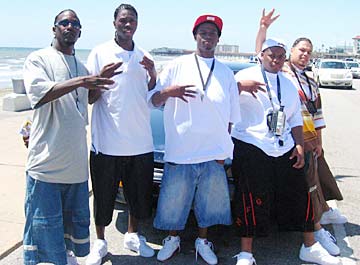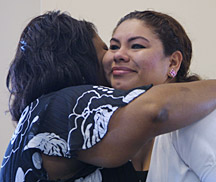Posted: 6/14/07
Global warming debate generates resolutions heat
By Marv Knox
Editor, Baptist Standard
SAN ANTONIO, Texas—Southern Baptist Convention messengers generated some heat during their annual meeting as they debated the government’s responsibility to address global warming.
They also stood by the SBC resolution committee’s decision not to address how many people actually populate Southern Baptist churches.
Otherwise, they quickly dispatched seven of eight proposed resolutions June 13.
The global warming resolution did not generate debate on its basic points: global temperatures have risen for decades, “scientific evidence does not support computer models of catastrophic human-induced global warming” and major steps to reduce greenhouse gases would unfairly impact the world’s poorest people.
But messengers disagreed over the SBC resolutions committee’s call for the government to do something about climate change.
The committee’s proposal encouraged “continued government funding to find definitive answers on the issue of human-induced global warming that are based on empirical facts and are free of ideology and partisanship.” It also supported “economically responsible government initiatives and funding to locate and implement viable energy alternatives” that would reduce greenhouse gas emissions.
Bob Carpenter of Cedar Street Baptist Church in Holt, Mich., proposed deleting the two sections of the resolution that called for government action.
“For 70 years, beginning with the Franklin Roosevelt administration, we’ve endured expansion of government,” Carpenter said, calling government “part of the cause of the problem rather than the solution.”
The government cannot provide simple solutions to problems, he contended, adding, “hundreds of millions of tax dollars already are being spent” by the government on global warming. He insisted private enterprise is a founding principle of the country. “We solve problems … when government stays out of the way.”
“The (resolutions) committee does believe the government has a role to play,” countered committee member Martha Lawley. The resolution acknowledges God’s sovereignty, as well as individual responsibility, and it is balanced, she said.
However, Wiley Drake, the convention’s second vice president and pastor of First Southern Baptist Church of Buena Park, Calif., claimed the disputed portions of the resolution undermine the SBC’s stand for separation of church and state.
“This weakens this resolution, by asking the government to step in,” he said.
“This is not a church-state issue,” Lawley maintained. “The government does have a role to play” in dealing with global warming.
Although messengers voted to remove the sections calling for government involvement, resolutions committee Chairman Gerald Harris later told reporters the convention overwhelmingly supported the overall resolution.
“I felt messengers were enthusiastic in adopting the resolution,” said Harris, editor of the Christian Index newspaper in Georgia. “I saw very few hands against” final passage of the resolution.
The only other extended debate featured a suggested resolution the committee declined to propose.
Tom Ascol, pastor of Grace Baptist Church in Cape Coral, Fla., noted he submitted a resolution on “integrity in church membership” that did not get past the committee.
While the convention’s annual survey claims SBC-affiliated churches are composed of 16.3 million members, only 6,138,776 of them attend a worship service in a typical week, Ascol said.
Southern Baptists should “repent of our failure to retain responsible church membership and our widespread failure to lovingly correct church members” when they lapse from regular church attendance, he added.
If the convention does not take seriously its responsibility to retain a regenerate church membership and to discipline members, then a call to repentance—the subject of an approved resolution—“is meaningless,” he insisted.
Ascol’s proposal “infringed upon the honored principle of church autonomy,” Harris responded. “The committee does not have authority to instruct churches on their membership.”
Malcolm Yarnell, a professor of Southwestern Baptist Theological Seminary and a member of Birchman Baptist Church in Fort Worth, Texas, affirmed Ascol’s call for “regenerate church membership based on church discipline.” But he noted the proposal was not broad enough, since it didn’t address issues such as believers’ baptism by immersion.
“When we say we are a convention of 16 million people, we will say, tongue in cheek, ‘The CIA and the FBI can’t find half of those,’” noted Doug Richie of Pisgah Baptist Church in Excelsior Springs, Mo. “It does affect us corporately as a convention. This is a problem, and it is time we take responsibility for it.”
Ascol’s proposal failed to receive a two-thirds vote required to override the committee’s decision not to recommend the resolution.
All seven of the committee’s other resolutions passed without significant discussion or debate. They included:
• Child abuse. Messengers expressed their “deep level of moral outrage and concern at any instance of child victimization” and recommended reporting child abuse “in a timely and forthright manner.”
The resolution called for churches and convention organizations to perform criminal background checks on ministers, employees and volunteers, and it renounced individuals who commit child abuse and “individuals, churches or other religious bodies that cover up, ignore or otherwise contribute to or condone the abuse of children.”
• Hate crimes. While urging Americans to “avoid acts of hatred and violence toward homosexuals and transgendered people” and calling on Christians to love and show compassion for them, the resolution condemned the Local Law Enforcement Hate Crimes Prevention Act of 2007.
The proposed law, which passed the U.S. House of Representatives and has been introduced in the Senate, provides a level of protection for homosexuals and transgendered people, the resolution noted. But it said hate crimes legislation “violates the U.S. Constitution’s Fourteenth Amendment guarantee of equal protection under the law” and “criminalizes beliefs as well as action, creating a form of thought crime.”
The resolution expressed “profound disappointment” in House members who passed the law and called on the Senate to “reject this and any other bill that creates a special protected status for certain groups.”
• Racism. Marking the 150th anniversary of the U.S. Supreme Court’s Dred Scott Decision—which declared African-Americans “had no rights which the white man was bound to respect”—the resolution affirmed the Declaration of Independence’s affirmation that “all men are created equal and are endowed by their Creator with certain inalienable rights.”
Messengers repudiated the Dred Scott Decision and affirmed the SBC’s 1995 vote to “unwaveringly denounce racism, in all its forms, as deplorable sin.” They also commended churches that reach out to all people, regardless of race, and they urged other churches to follow that example.
• Pastors, culture and civic duty. “There is a great need for a new generation of pastors to take the lead in courageously confronting an American culture and government that is hurtling downward to new depths of moral decadence,” the resolution noted. It cited “continued threats to the sanctity of human life, the sacredness of marriage between one man and one woman, and the fundamental freedom to express our faith in the public arena.”
It called on pastors to “preach the whole counsel of God, not only passionately inviting people to Jesus, but also prophetically declaring biblical truth concerning the burning moral issues that are being debated in the culture and government.”
It also encouraged them to model and promote “informed and active Christian citizenship among the membership of our churches.”
• Personal and corporate repentance. Citing Scriptures that condemn vindictiveness, bitterness, slander, sexual immorality and “failure to obey God,” the resolution called for “all Southern Baptists to humble ourselves before God” and “embrace a spirit of repentance, pursue face-to-face reconciliation where necessary and enter into a time of fasting and prayer for the lost.”
• Cooperative giving. A resolution offered by the presidents of the SBC’s two mission boards lauded record receipts for the convention’s Cooperative Program unified budget and its home and foreign missions offerings. In response, messengers expressed appreciation to Southern Baptists for their faithful and generous support for convention funding.
They also thanked God for “allowing us to join him on mission” and thanked churches, associations, state conventions, SBC organizations and Woman’s Missionary Union for “their faithful partnership and diligent promotion of missions support.”
• Appreciation. Messengers thanked Baptists from San Antonio, as well as convention officers, other leaders and program personnel.
The committee declined to act on several suggestions on two topics that received intense discussion when messengers acted on motions—glossolalia, or the practice of “private prayer language,” and the ability of the 2000 Baptist Faith & Message doctrinal statement to serve as a “guide” for SBC agencies and institutions.
Harris and Lawley said those topics did not meet the committee’s criteria for action.
“We did not feel the resolutions committee was the Supreme Court to address theology for the convention,” Harris said. “We didn’t want to precipitate a debate.”
Glossolalia and the Baptist Faith & Message are topics best suited to be handled by motions, not resolutions, Lawley added.
“Motions direct” convention entities to take actions, while “resolutions reflect” the messengers’ beliefs, she explained.
“Resolutions are intended to reflect consensus of Southern Baptists on issues, not lead the way,” she said, adding glossolalia and the Baptist Faith & Message proposals did not fall within the committee’s purview.
News of religion, faith, missions, Bible study and Christian ministry among Texas Baptist churches, in the BGCT, the Southern Baptist Convention ( SBC ) and around the world.



